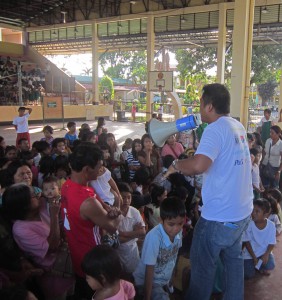
Children caught in armed conflict are entertained at an evacuation center in Mindanao. The 40-year-old conflict has claimed more than 140,000 lives. (Morning Star News)
MINDANAO, Philippines (Morning Star News) – Christians and others in the southern Philippines have expressed strong fears that legislation creating an Islamic sub-state on Mindanao Island will exacerbate religious tensions rather than resolve them.
The Bangsamoro Basic Law (BBL), proposed by President Benigno Aquino III last September with the aim of ending decades of Islamist rebel violence in Mindanao, was approved by a House Ad Hoc Committee on May 20 with 50 members voting yes, 17 voting no and one abstaining. The area, comprising five provinces with sizeable non-Muslim populations, already enjoys a measure of autonomy as the Autonomous Region of Muslim Mindanao (ARMM), and the proposed BBL would give leaders sufficient independence to impose sharia (Islamic law).
“What President Aquino is doing is treasonous to Christian communities in Mindanao,” Rolly Pelinggon, national convener of Mindanaoans for Mindanao (M4M), told Morning Star News.
If Bangsamoro, or “Moro Country” with Moro being colloquial for “Muslim,” were ruled under sharia, non-Muslims would become second-class citizens with drastically reduced rights. Critics of the bill say it would render the federal government powerless to redress human rights abuses under Islamic law.
Pelinggon said the BBL would thus worsen Muslim-Christian conflict. Besides intensifying religious-cultural differences between Christians and Muslims, the BBL would also facilitate monopoly of oil and gas resources by vested groups in Mindanao, he said.
The BBL came about as part of a preliminary peace accord, the Bangsamoro Peace Framework Agreement (BPFA), between the Aquino administration and the Moro Islamic Liberation Front (MILF) rebel group, but it has done little to reduce violence. The BPFA was signed in 2013 as a precursor to a final peace agreement. The government claimed there would be no more Muslim rebel attacks in Mindanao after it was signed, but in some areas violence has increased.
In Basilan Province of the ARMM, Muslim separatist groups raided the town of Maluso on June 1 and cut off the Water District Office, managed mostly by Christians. The municipality is now suffering from water crisis that has destabilized the local economy, while security forces have engaged in a firefight with rebels that put more than 20,000 civilians in evacuation centers.
In Pikit, Cotabato Province, two men aboard a motorcycle in October 2014 threw a grenade at a United Church of Christ congregation at the height of worship, killing a nurse and a teacher. The blast injured another teacher and two other businessmen. Separatist rebels have been active in North Cotabato for past 20 years.
In Zamboanga City, an anti-bomb squad of the Philippine Police detonated an Improvised Explosive Device on Oct. 11, 2014. The bomb was similar to previous devices manufactured by separatist rebels. Zamboanga is home to more than 100,000 evangelical Christians and Ebenezer Bible College and Seminary, one of the first Protestant Bible schools in the Philippines.
Zamboanga City Mayor Maria Isabella Climaco announced in public that Zamboanga will never be part of the BBL and is one of the country’s staunchest critics of the legislation.
In Cotabato, indigenous tribal leader and village chieftain Jojo Sibug also told Morning Star News the BBL would aggravate religious conflict in Mindanao. Noting that the first inhabitants of Mindanao were the Manobo and other indigenous tribes, Sibug denied Islamic claims to the region.
“Our ancestors were already here even before Islam came to Mindanao,” he said. “This Philippine government should consider the welfare and plight of the indigenous tribes, and the Aquino administration should not only focus on one sector, but it should remember the indigenous people were also the first inhabitants of Mindanao.”
Tribal chiefs ruled Mindanao until the 1400s, when many of them embraced Islam after an Arab trader arrived to the island. In the 1900s, U.S. missionaries came to the Philippines and built a number of Christian schools in Mindanao. Many of the indigenous tribes embraced the evangelical Christian faith, including the ancestors of Sibug.
As part of the peace process, early this month the MILF surrendered 75 World War II firearms out of its 16,000 weapons to the government. Opposition Sen. Bongbong Marcos questioned why only 75 weapons were surrendered as part of the decommissioning process. Marcos presides over the Senate committee that conducts hearings on the BBL.
The fate of the BBL lies in the hands of the country’s 24 senators now deliberating the bill. A March poll found that 44 percent of Filipinos opposed the bill, and 22 percent supported it. In Mindanao, 62 percent of those surveyed opposed the bill.
Some have also questioned the 75 billion-peso (US$170 million) budget that would be allocated for the Bangsamoro government. Some critics believe that the MILF could use this huge amount to buy more sophisticated firearms to expand its control. By comparison, the Philippine military has a budget of only 15 billion pesos annually (between 2012 and 2017), or US$34 million.
In Manila, three archbishops, former National Security Adviser Norberto Gonzales, former Sen. Francisco Tatad and the Philippine Constitution Assembly on June 19 filed a petition with the Supreme Court to nullify the March 2014 Comprehensive Agreement on Bangsamoro that gave rise to the BBL. The Supreme Court is expected to rule on the case.
While Christian leaders fear abuses if the BBL were passed into law, some lawmakers also warned there would be war if the BBL fails to pass. Rep. Tupay Loong of Sulu, a former member of the rebel Moro National Liberation Front (MNLF), said in February that if the BBL is not passed, “the war will continue.”
The BBL measure was reportedly fast-tracked by bribes to lawmakers; the Philippine Daily Inquirer reported the accord was endorsed by a majority in Congress after lawmakers accepted US$10 million in bribes to endorse it to the Senate.
In spite of congressional denials, investigative journalist Christine Herrera, who first exposed the alleged $10 million in bribes, has said she stands by the story because no fewer than two high-ranking officials of Congress confirmed the wrongdoing.
Davao City Mayor Rodrigue Duterte said the BBL could increase chances of Christians getting caught between the MNLF and the MILF, who are fighting each other.
“What I don’t like about Manila is they make wrong decisions for Mindanao,” he recently told a national newspaper. “They act as if they know everything about our land, and then put us in jeopardy.”
If you would like to help persecuted Christians, visit https://morningstarnews.org/resources/aid-agencies/ for a list of organizations that that can orient you on how to get involved.
If you or your organization would like to help enable Morning Star News to continue raising awareness of persecuted Christians worldwide with original-content reporting, please consider collaborating at https://morningstarnews.org/donate/?
###
© 2015 Morning Star News. Articles/photos may be reprinted with credit to Morning Star News.
Morning Star News is a 501(c)(3) non-profit corporation that relies solely on contributions to offer original news reports of persecuted Christians. By providing reliable news on the suffering church, Morning Star News’ mission is to empower those in the free world to help and to encourage persecuted Christians that they are not forgotten or alone. For free subscription or to make tax-deductible donations, contact [email protected], or send check to Morning Star News, 34281 Doheny Park Rd., # 7022, Capistrano Beach, CA 92624, USA.
- Children caught in armed conflict are entertained at an evacuation center in Mindanao. The 40-year-old conflict has claimed more than 140,000 lives. (Morning Star News)


We, the American People believe that the Filipino PEOPLE have the unbending FAITH and courage to stand against the evil muslims’ expanding tentacles all over the world. The Philippines is a bulwark of FREEDOM for four hundred years even under the Spanish Toteletarian Regime. God Bless the Philippines and it’s PEOPLE…
Islam is very similar to a zombie virus in the movies. Except it’s more dangerous because the consequences are not immediately obvious. I believe that people are by nature good, yet as soon as Islam takes hold, that person is never the same again. I’m a Christian but I don’t go nuts if someone makes a Catholic joke. But very rarely will anyone ever tell a Muslim joke (out loud). They know they’d have a million people trying to cut their head off. Islam is a virus that turns normal people into crazies. How do we stop it without resorting to violence, which is not acceptable? How?
it’s seems that you’re stereotyping Islam. The Violent Muslims around the world are being abused by Non-Muslim leaders. Maybe you guys should know the History before acting like an idiot. Why don’t you do some research with an equal criticism. I know Muslims aren’t perfect but indeed believers knows that Islam is a perfect way of life. It is just how Muslim will carry it out.